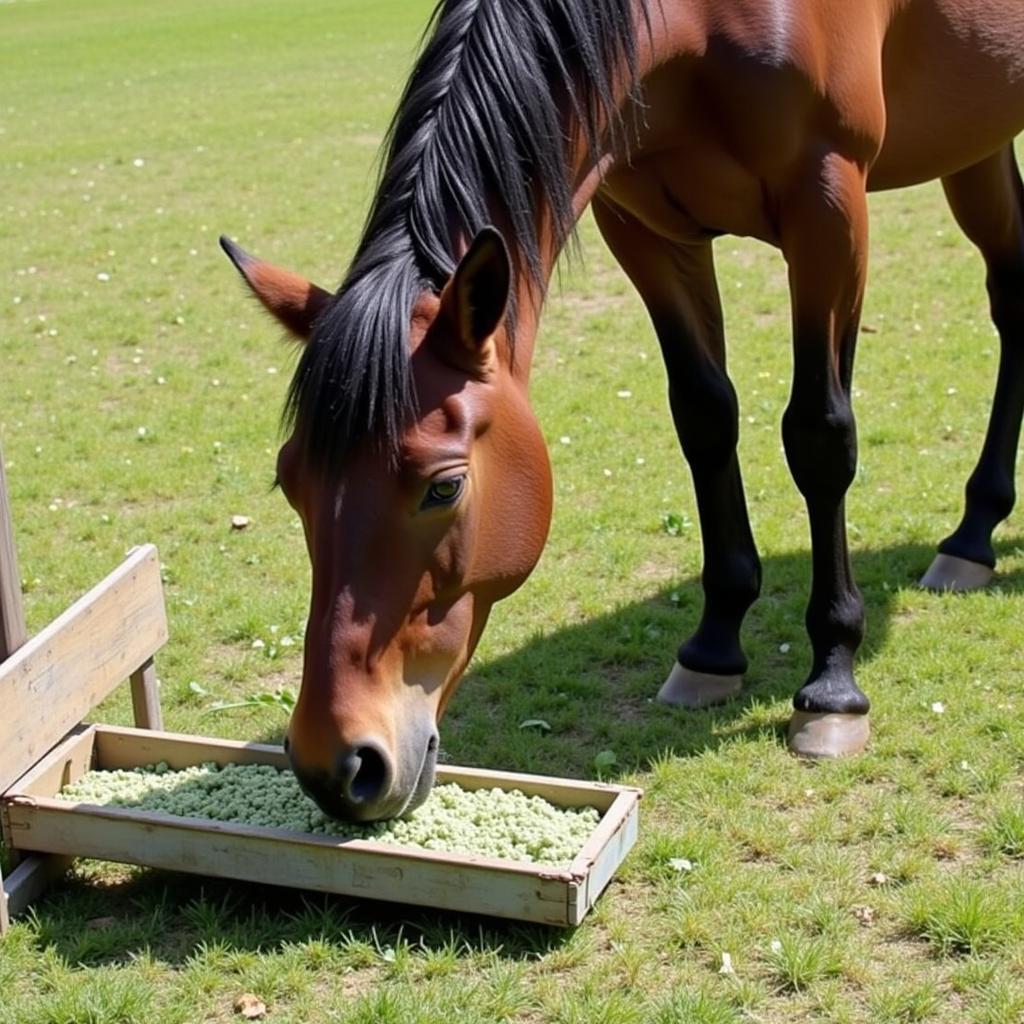Chopped Alfalfa For Horses is a popular forage option, offering a good source of protein and fiber. But is it the right choice for your equine companion? This comprehensive guide delves into the benefits and drawbacks of chopped alfalfa, helping you make informed decisions about your horse’s nutritional needs. We’ll explore everything from its nutritional profile to feeding guidelines and potential concerns.
Understanding the Nutritional Value of Chopped Alfalfa
Alfalfa, known as the “queen of forages,” is a legume packed with essential nutrients for horses. Its high protein content makes it an excellent choice for growing horses, lactating mares, and performance animals requiring extra energy. Compared to grass hays, alfalfa boasts significantly higher levels of calcium and other vital minerals. However, this high calcium content can be a concern for some horses, particularly those prone to urinary calculi. It’s crucial to consult with your veterinarian to determine the appropriate amount of chopped alfalfa to incorporate into your horse’s diet. Remember, a balanced diet is key to maintaining your horse’s overall health and well-being.
Benefits of Feeding Chopped Alfalfa to Horses
Chopped alfalfa offers several advantages for horse owners. Its chopped form reduces waste compared to long-stem alfalfa, making it a more economical option in the long run.  Horse Eating Chopped Alfalfa Additionally, chopped alfalfa is easier to digest, especially for horses with dental issues. It can also be conveniently soaked to create a mash, particularly beneficial for horses with difficulty chewing or swallowing. Consider adding a mash, similar to our mash for horses, to further support your horse’s digestive health. Furthermore, chopped alfalfa’s palatable nature encourages even picky eaters to consume their required forage.
Horse Eating Chopped Alfalfa Additionally, chopped alfalfa is easier to digest, especially for horses with dental issues. It can also be conveniently soaked to create a mash, particularly beneficial for horses with difficulty chewing or swallowing. Consider adding a mash, similar to our mash for horses, to further support your horse’s digestive health. Furthermore, chopped alfalfa’s palatable nature encourages even picky eaters to consume their required forage.
Potential Drawbacks and Considerations
While chopped alfalfa offers numerous benefits, it’s essential to be aware of potential drawbacks. Its high protein and calcium content can be problematic for certain horses. Overfeeding can lead to weight gain, especially in horses with lower energy requirements. Too much calcium can contribute to the development of urinary calculi. For some horses, chopped alfalfa can also be more prone to mold growth if not stored properly. Therefore, it’s crucial to monitor your horse’s condition and adjust their diet accordingly. When considering other forage options, explore resources like our guide on fodder for horses.
Feeding Guidelines for Chopped Alfalfa
How much chopped alfalfa should you feed your horse? The answer depends on several factors, including the horse’s age, activity level, and overall health. Always consult with your veterinarian or equine nutritionist to determine the appropriate amount for your individual horse. As a general guideline, chopped alfalfa should not exceed 50% of the horse’s total forage intake. You can learn about alternative forage choices, like chaff hay for horses, for a more balanced diet. Introducing chopped alfalfa gradually is essential to prevent digestive upset. Monitor your horse’s weight, body condition, and manure consistency to ensure they are thriving on their diet.
Is Chopped Alfalfa Right for Your Horse?
Deciding whether to feed chopped alfalfa requires careful consideration of your horse’s individual needs. If you are considering alfalfa in other forms, you can learn about alfalfa pellets horse and horse alfalfa cubes on our website. While it offers valuable nutrients, its high protein and calcium content might not suit all horses. Work closely with your veterinarian to determine the best forage plan for your equine partner.
Expert Insight from Dr. Emily Carter, Equine Nutritionist: “Chopped alfalfa can be a valuable addition to a horse’s diet, but moderation is key. Always prioritize a balanced nutritional plan tailored to your horse’s specific needs.”
Expert Insight from John Davis, Experienced Horse Trainer: “I’ve found that chopped alfalfa is easier for my horses to consume, especially the older ones. It’s also a great way to add extra calories and protein to their diets when needed.”
Expert Insight from Sarah Miller, Equine Veterinarian: “While chopped alfalfa is a good source of nutrients, it’s crucial to monitor calcium intake, particularly in horses predisposed to urinary issues.”
In conclusion, chopped alfalfa for horses offers a nutrient-rich forage option, but it’s vital to consider your horse’s individual needs and consult with a professional to determine the appropriate feeding strategy.
FAQ
-
Can I feed chopped alfalfa to my senior horse?
-
Is chopped alfalfa suitable for horses with metabolic issues?
-
How should I store chopped alfalfa to prevent mold growth?
-
Can I mix chopped alfalfa with other forages?
-
What are the signs of overfeeding chopped alfalfa?
-
How much chopped alfalfa should I feed my performance horse?
-
Can I feed chopped alfalfa to pregnant mares?
For any assistance, contact us at Phone: 0772127271, Email: [email protected] or visit us at QGM2+WX2, Vị Trung, Vị Thuỷ, Hậu Giang, Việt Nam. We have a 24/7 customer service team.